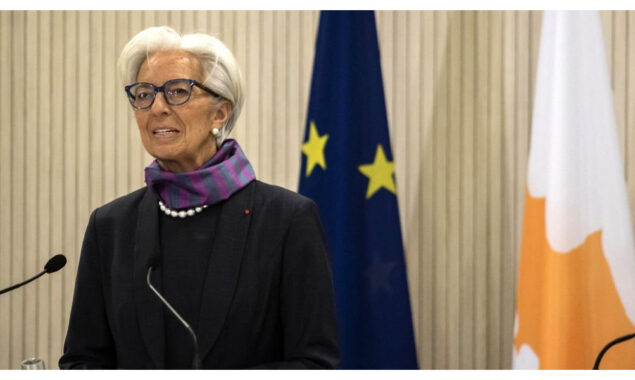
ECB signals rate hike as soon as July to combat inflation
Christine Lagarde, the head of the European Central Bank, hinted on Wednesday at a first interest rate hike in July to cover soaring inflation, loading the actions of other major central banks and signaling the end of the eurozone’s cheap money era.
The ECB must end its bond-buying stimulus “early in the third quarter” and could grow interest rates “only a few weeks” then, Lagarde said in a speech in the Slovenian capital Ljubljana.
The statement is the clearest sign yet from Lagarde that the ECB is ready to move on rates sooner rather later, as the institution trails rate hikes made by the US Federal Reserve and others to tame inflation globally.
Any hike would be the ECB’s first in over a decade and would lift rates from their current historically low levels.
These include a minus 0.5 deposit rate which effectively charges banks to park their excess cash at the ECB overnight.
Inflation in the eurozone climbed to 7.5 percent in April, an all-time high for the currency club and well above the ECB’s own two-percent target.
The surge, driven in no small part by steep increases in prices for energy due to the Russian invasion of Ukraine, has strengthened calls for the ECB to follow its peers towards hikes.
ECB policymakers will decide their course of action in upcoming June 9 and July 21 meetings, with the July date now seen as the most likely opportunity for a rate announcement.
At its last meeting in April, the ECB’s governing council resolved to end its vast monthly bond purchases “in the third quarter”.
Over recent years, the scheme has hoovered up billions of euros in government and corporate bonds each month to stoke economic growth and keep credit flowing in the 19-nation currency club.
The ECB should draw a line under it “early” in the third quarter, which starts in July, Lagarde specified on Wednesday.
Ending net purchases under the program would open the door to an interest rate rise that could follow “only a few weeks” after, she said.
After the initial move the process of monetary policy “normalization”, taking interest rates out of the negative territory, would be “gradual”.
“To sum up Lagarde’s speech: first rate hike on July 21,” Carsten Brzeski, head of macro at ING bank, said on Twitter.
Decisions by the Fed and the Bank of England to raise rates aggressively to counter inflation have added to the pressure on the ECB to act.
German central bank president Joachim Nagel said Tuesday he “will advocate a first step normalising ECB interest rates in July”.
The call made by the head of the traditionally conservative Bundesbank has been echoed by other members of the governing council.
On Wednesday, the head of the French central bank Francois Villeroy de Galhau also said the ECB would “progressively raise rates from the summer” to steer inflation towards the ECB’s two-percent target.
The central bank is set to ratchet up interest rates at a delicate moment for the economy.
The war in Ukraine has both pushed up prices and added to supply chain disruptions, putting further strain on households and businesses.
In response to the invasion, the European Union has sought to reduce its reliance on Russian energy imports and is in discussions over an embargo of Russian oil that would add to the economic stress.
Gilles Moec, chief economist at Axa insurance, told AFP that the ECB would raise interest rates in July, “followed by a return to zero in September.”
However, “between the war in Ukraine and a complicated coronavirus situation in China,” which has seen a series of lockdowns and spillovers from US rate hikes, the ECB will be unable to “pursue normalization easily,” according to Moec.
Read More News On
Catch all the International News, Breaking News Event and Latest News Updates on The BOL News
Download The BOL News App to get the Daily News Update & Follow us on Google News.




